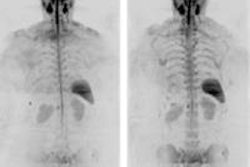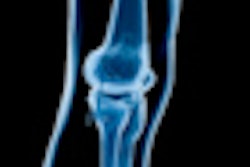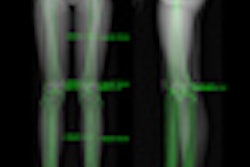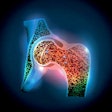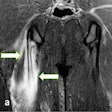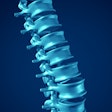
CHICAGO - Whole-body MRI edged out spinal MRI in terms of prognostic value for multiple myeloma patients after stem cell transplantation, according to new German research presented on Monday at the RSNA congress.
If dedicated coil spinal MRI using Salmon and Durie Plus staging was used alone, radiologists would have missed progressive disease in 93% of multiple myeloma patients, according to Dr. Christoph Weber of the department of diagnostic and interventional radiology at University Hospital Hamburg-Eppendorf in Hamburg, Germany.
In the study, 40 patients with multiple myeloma after stem cell transplantation were examined twice on a 1.5-tesla scanner (Achieva, Philips Healthcare) with a whole-body MRI protocol using a fat-suppressed short tau inversion recovery (STIR) sequence, T1-FEE, and contrast-enhanced fat-suppressed T1 sequences. Follow-up with whole-body MRI after stem cell transplantation was in 1.3 years.
At baseline, 20 whole-body MRI patients were in complete remission and 20 patients were in partial remission. At baseline and follow-up, whole-body MRI revealed no pathological findings in nine out of 40 patients (23%). Follow-up whole-body MRI revealed regredient findings of bone involvement in five of 40 patients (13%), 12 patients (30%) had no change in bone involvement, and 14 patients (35%) had progressive bone involvement. Progredient findings were located in the axial skeleton in one of 14 patients (7%), in the axial and extra-axial skeleton in nine of 14 patients (64%), and outside the axial skeleton in four patients (28%). The majority of the findings (86%) were osseous, while the rest were osseous as well as extraosseous.
"Therefore, the whole-body MRI information has in 28% restaging relevance in accordance with the Salmon Durie staging system due to the whole-body MR information in comparison to MR of the spine," Weber said. "Whole-body MRI ... is superior to the spine alone as proposed by the Salmon Durie staging system. It is a significant prognostic tool and it's recommended for post-therapeutic monitoring."
Whole-body MRI also provides information about possible complications or fractures in the patient, he added.



